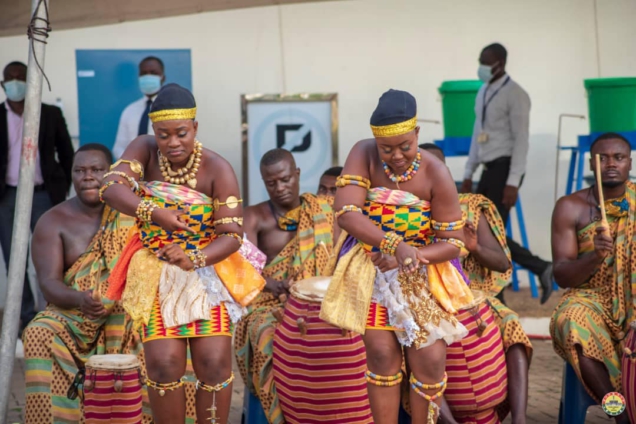I am still continuing with my exercise of searching for Ghanaian values.
Drumming and dancing are an integral part of our lives. We drum and we dance at the slightest provocation.
We drum and dance when we are happy, to celebrate births, outdoorings, marriages, birthdays, and festivals. We drum and dance when we are sad, and when there is a death, all the rites are accompanied with drumming and dancing.
I confess that sometimes I can’t quite see the point of drumming and dancing but I accept that it is a distinguishing factor in being Ghanaian.
I also accept that according to customary practice, when you are moved by the performance of a dancer or drummer, you are expected to demonstrate your appreciation by giving some money.
You would plaster on the forehead of the dancer or drummer, a cedi note of whatever denomination, there would be a few more intricate dance steps and complicated drumbeats to acknowledge the donation.
It is a ritualised procedure, not quite on the scale of the “spraying” our Nigerian cousins do, but it is Ghanaian and sets us apart.
Now I notice that the dancers don’t wait to be appreciated, they demand that you give them money. The next time you are at a function where there are Adowa or Kete dancers, just take a careful look, especially at funerals.
As the guests walk in and are being announced, the dancer glides toward the new arrival as he tries to make his way to greet them.
The dance moves are saying: do the right thing, give me some money and get on with it.
If you try to ignore the dancer, he becomes insistent and tries to block your way. People are often forced to part with some money and it is interesting that as soon as the cedi note gets into the dancer’s hands, the dancing stops and he positions himself to accost the next arrival.
I was at a recent funeral; the male dancer made no attempt to give the impression he was welcoming you, it was a case of you are going to give me some money or you are not moving forward and I will make sure the entire gathering notice you are a mean, chisel-handed person.
The dancer pulled faces at the back of the few brave people who resisted the obligatory money donation and then laid in wait for the next unsuspecting mourner to arrive.
There was a beautifully dressed, five-year-old, Adowa-dancing girl. She was no less mercenary in outlook than the man. She only danced in front of arriving guests and physically tried to prevent them from moving on unless and until they gave her money.
I am afraid I couldn’t really appreciate her dancing skills, nor what should have been the undoubted charm of a five-year-old bedecked girl because she did not even try to dance unless it was to extract money out of someone and she was dancing only to the give-me-money-beat.
When you see such things at our most sacred customary functions, you wonder about these vaunted Ghanaian values that we tout so much.
What do I tell a non-Ghanaian visitor who comes along with me to such a function? This is Ghana at its traditional best?
Latest Stories
-
Dreams FC denies allegations of attempting to sign Najeeb Yakubu
28 mins -
Election 2024: ‘Right to free and fair elections non-negotiable’ – Akufo-Addo
34 mins -
Kurt Okraku took out my passport from the U23 squad that travelled to Japan – Najeeb Yakubu alleges
44 mins -
Where hope fails: Ghana’s decaying home for the destitute
54 mins -
NDC Mining Committee for 2024 campaign refutes allegations of recruiting thugs for elections
1 hour -
Traction Control: A lifesaver with an off switch? Here’s why it exists
1 hour -
I don’t need anyman to woo me with money – Miss Malaika 2024 winner refutes pimping claims
1 hour -
”Kurt Okraku sabotaged my national team career because I refused to sign with Dreams FC” – Najeeb Yakubu
1 hour -
Businesses urged to leverage Generative AI for enhanced customer engagement
1 hour -
MultiChoice Ghana partners with Ghana Hotels Association to elevate guest entertainment
1 hour -
Bawumia’s music streaming app or Mahama’s pay-per-view TV channel?
2 hours -
Karpowership Ghana empowers 40 Takoradi Technical University students with scholarship
2 hours -
We expect significant reduction in prices of petroleum products in coming weeks – CEO AOMC
2 hours -
Betway Africa offers once-in-a-lifetime ‘Play-on-the-Pitch’ experience at Emirates Stadium
2 hours -
I coined the term ‘hype man’ in Ghana – Merqury Quaye
2 hours

